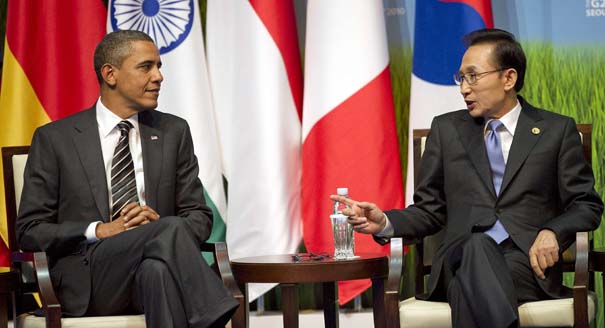Douglas H. Paal
{
"authors": [
"Douglas H. Paal"
],
"type": "questionAnswer",
"centerAffiliationAll": "dc",
"centers": [
"Carnegie Endowment for International Peace",
"Carnegie Russia Eurasia Center"
],
"collections": [],
"englishNewsletterAll": "asia",
"nonEnglishNewsletterAll": "",
"primaryCenter": "Carnegie Endowment for International Peace",
"programAffiliation": "AP",
"programs": [
"Asia"
],
"projects": [],
"regions": [],
"topics": []
}
Source: Getty
China and the United States—A Difficult Year Ahead
While there has been an increase in heated rhetoric over sensitive issues between Beijing and Washington, both governments are trying to prevent emotions from getting out of control, aware that the United States and China must work together to resolve a multitude of transnational challenges.
Tensions seem to be on the rise between China and the United States. With disputes emerging over U.S. arms sales to Taiwan, President Obama’s upcoming meeting with the Dalai Lama, Iran’s nuclear program, and bilateral trade, there is a fear that disagreements could sour relations and prevent cooperation between Washington and Beijing.
In a new video Q&A, Douglas Paal analyzes the current state of relations, the severity of the disputes, and the likelihood of continued cooperation. Paal says that while there has been an increase in heated rhetoric over sensitive issues, both governments are trying to prevent emotions from getting out of control. And despite the current downturn in relations, “there’s almost no transnational problem that doesn't require the United States and China to work together.”
- Are tensions between the United States and China on the rise?
- Will U.S. arms sales to Taiwan cause lasting damage to U.S.-China ties?
- What's the significance of Google’s statements that it may pull out of China?
- Was China unhelpful during the global climate change negotiations in Copenhagen?
- How will President Obama’s upcoming meeting with the Dalai Lama impact U.S.–China relations?
- How will trade imbalances and complaints over China's currency cloud the bilateral relationship?
- Why is China resistant to toughening sanctions on Iran to curb Tehran’s nuclear ambitions?
- What should the United States and China do to preserve solid ties?
During his first year in office, President Obama sought a strong relationship with China and partnership on critical global issues. Why are there fears that the relationship is set to get rockier despite a year of positive diplomacy?
President Obama came into office and concluded that, as in Africa, in China the Bush administration had not left a wreck behind and there was something on which to build a foundation for further progress. Moreover, he had campaigned on the promise of addressing the global financial crisis, climate change, and nonproliferation issues, including Iran and North Korea—you can’t solve those problems without getting China involved.
Obama wanted to test the waters to see how much China could cooperate on these issues before getting into the back and forth of the difficult ones. President Obama scheduled a summit meeting in China for the end of 2009 to push his agenda with the Chinese.
There were early indications that there would be some progress and on the financial crisis there was considerable progress: China did a lot to stimulate its economy and provide global growth (problems are arising now, but that happens). Second was climate change. There China moved more than we expected in terms of promising to enhance energy efficiency. But in the final analysis of Copenhagen, it was a pretty messy process and the outcome was very weak, and may even be weaker as time goes on.
The third area was nuclear nonproliferation. China helped get North Korea back into talks with the United States and backed them down from some of their more provocative stances. This is a good thing, but it’s not the end of the road—we have a long way to go. On Iran, China had previously been hiding behind Russia. Russia was the one that stood in the way of sanctions to try to move the Iranian government out of their nuclear weapons program. Now Russia has modified its position and China looms large as the most important impediment to tougher sanctions on Iran.
Those are positives and negatives that have emerged over the past year. To get to that point, a number of sensitive issues in U.S.–China relations were postponed so that there would be no diplomatic impediment, but the time to deal with those is now. This includes arms sales to Taiwan, which is a long-standing American commitment that Mr. Obama could not avoid, and secondly a meeting with the Dalai Lama, which every president has done since 1990. To China, the Dalai Lama represents a sensitive subject. There were riots a couple of years ago and a crackdown still continues in Tibet. The Dalai Lama is the spiritual and natural political leader of Tibet and so Beijing is sensitive to Obama meeting with him here in Washington.
China reacted angrily to the announcement that the United States will sell $6.4 billion in arms to Taiwan. Why is the United States selling arms to Taiwan? Will the arms package cause lasting damage to U.S.–China ties?
The United States, since 1979 when we recognized the People’s Republic of China as the legitimate government of China, has had a very ambiguous stance on the status of Taiwan. And part of that has been to help reinforce Taiwan’s autonomy from China by maintaining a sufficient self-defense capability that China will not be able to easily coerce Taiwan into doing what it doesn't want to do. To that end, every administration has sold weapons to Taiwan at various points.
There was some unfinished business leftover from the Bush administration and it has come up for Obama. He waited until after his own visit to China to make some decisions on what are purely defensive systems—including missile defenses and Black Hawk helicopters, which are useful for combat over waters near Taiwan and humanitarian purposes in storms and rescue situations. China has reacted pretty strongly to this.
One of the features of this decision is that it has been mulled openly for six months. China is a new and more open society in many ways—they have new journals and a very active Internet population. Lots of opinions have been expressed about how to deter the United States from making further arms sales to Taiwan or how to punish the United States if it does make sales. And so we’ve seen a lot of heated rhetoric and it has shown up in our own media, reflecting the strength of opinion held by ordinary people in China.
I detect in the response from China a need to placate domestic opinion with strong sentiment, but at the same time a desire to manage this issue so that it doesn't get out of control. The language used in the protest from the ministry of foreign affairs was slightly modified from the last protest that they gave in 2008 before we had a very nice 2009 in U.S.–China relations.
After a period we will get back to a better relationship, but we are probably going to slide down a little further in our relationship because we have an upcoming meeting between the president and the Dalai Lama. China won’t like that and it will further feed the emotional rhetoric coming out of China. As I say this though, I do see the Chinese officials trying to hold a steady hand and not allow this to spill out of control.
Of course with emotions running high, things can spill out of control—unintended events can take us there. It’s encouraging that officials both here and in China are trying to anticipate that and keep this from spilling over into a bigger impact on our broader U.S.–China relationship.
Following assaults from hackers on its computer systems, Google said it would stop cooperating with Chinese internet censorship and threatened to leave the country. What's the meaning of Google's statements and connection to the broader issue of Internet freedom?
The Google case is a really interesting story in China. There has been a lot of pressure on Google not to participate as a search engine in China because Chinese law requires self censorship by companies. Google was censoring according to Chinese law, but it was uncomfortable with it and had a trial period. Second, Google has shown evidence that it was hacked—not only Google, but 32 other companies had their source code stolen by entities that looked like they came from China, although you can’t really take a smoking gun into court and prove it. Third, there is a human rights issue. Some of the human rights activists in China have had their Gmail accessed through the Google system.
All of these got jumbled together in Google’s protest, but Google said that it was going to stop working as a Chinese search engine and therefore won’t need to abide by Chinese law to conduct censorship. But Google would like to stay in China and see if they could find a negotiated arrangement to keep Gmail.com working in China and also to introduce a couple new telephones to sell in China (and there are some other businesses, research, and a number of people working for the company).
At first, China’s reaction to Google’s statement was pretty angry because it lumped together commercial, human rights, and technical issues. But within days you could see Chinese officials calling this a commercial matter, not a political matter, and trying to contain it. This suggested that they were prepared to sit down and negotiate with Google.
But then, quite coincidentally, Secretary Clinton gave a speech on Internet freedom, which seemed to once again politicize the issue, although as I understand this was not the intent of the administration. Nonetheless, the reaction in China was that this was politicization. But again, I saw the hand of officials trying to prevent this from getting out of control. A statement was posted by the ministry of foreign affairs spokesman on a bulletin board, he was asked questions about this issue repeatedly in a press conference and declined to stir it up anymore. So I think China is still in a negotiating mode and I suspect Google is too and some of this will sort itself out.
There is a need for public education on Internet matters—the vulnerability all of us have to internet hacking, the privacy and security issues, and also internet infrastructure. China is building a far more advanced infrastructure that will allow hackers to operate from China—this is not the intent of the infrastructure, but a result is hackers can operate from China without being caught. In the United States, we are on an older Internet infrastructure system known as Internet protocol version 4, unlike version 6 that China uses. It is more limited, it is private sector and doesn’t have big government hand guiding policy, but it makes us more vulnerable than we need to be. We ought to be having a discussion in this country about upgrading our infrastructure to protect us better.
Media coverage has depicted China as an obstruction during the global climate change negotiations in Copenhagen. What do China's diplomatic policies indicate and how will China contribute to future efforts to reduce climate change?
China at Copenhagen took a hit to its reputation. The country scored points in November by saying that it was going to reduce its carbon intensity by 45 percent by 2020. The efforts to codify this and provide verification mechanisms seemed to set off China and a lot of the other G77 countries that don't want to be held to standards as high as the United States and Europe would like. So we had a mess in terms of objectives.
It was also a poorly run meeting and many things started to happen—the timing of meetings fell apart, participation issues arose, and there were heated arguments, including China’s environmental minister pointing his finger and yelling at President Obama. This didn’t do China any good.
On the other hand, one doesn't want to draw the direst conclusions from this—there were a lot of reasons Copenhagen didn’t go well. Some of the media play about China (not to defend China in particular) took the issue further than the facts would allow.
After delaying a meeting before his trip to China in 2009, President Obama is set to meet with the Dalai Lama this month despite China’s objections. How will this impact U.S.–China relations and what is the significance of the meeting?
The Dalai Lama and the cause of Tibet enjoy special status in the United States. There is a long history. We’ve had a history of CIA cooperation and support for the Dalai Lama, but that ended in the Nixon administration. It’s a long time now. Most Americans support the Dalai Lama as a revered religious leader and believe that Tibetans were promised and should receive greater autonomy within China’s borders—not challenging the sovereignty of China over Tibet, but how Tibet is governed
The Chinese have reacted to this badly as they see Tibet in a different light. They believe they have been overly generous to the Tibetan people and in return the Tibetans have been ungrateful to Chinese investments in their area. They are talking past each other. Many experts watch from the outside and wish China would make some adjustments in its policy to give greater economic, social, and other benefits and relaxation to the people in Tibet.
As a symbol of America’s support, the Dalai Lama has been received by American presidents since 1990 when I was the first person to escort the Dalai Lama in to meet George H. W. Bush. The Dalai Lama is not exploiting these meetings for political effect; he’s treated as a revered religious leader. The United States has urged China to get into talks with his representatives and surprisingly enough they did have a meeting with the representatives just last week. Once again it went nowhere, but this time at least it wasn't as rancorous of a departure for the representatives as it was the previous time they left Beijing.
The Dalai Lama’s visits are something that’s part of the fabric of our relationship with China—China rejects that. China will probably react by declining to send their president to an upcoming Nuclear Security Summit in Washington. They will send a lower level representative as a signal of their unhappiness with the United States, as they would put it, interfering in their core interests in Tibet and Taiwan.
Bilateral trade disputes between China and the United States are looming. How will trade imbalances and complaints over China's currency cloud the bilateral economic and political relationship?
China’s currency and trade disputes are interrelated—sometimes lumped together wrongly, sometimes put together rightly in public discussions. China is producing far more than it can consume so that’s going to turn up in the international marketplace and where it does people are going to object and say they are dumping and disrupting natural markets for other countries, and we are going to have trade disputes.
China is also keeping the value of its renminbi currency low, because it wants to keep its workers working in a time of financial strife around the world. What we need is some harmony around the world with everybody sacrificing a little bit. But that doesn't usually happen. What usually happens is you have trade disputes, especially in periods of high unemployment as we have in the industrial West.
The disputes between the United States and China are growing and are going to grow exponentially as we approach the [U.S. Congressional] elections later in 2010. In Europe, the disputes are actually worse. The Euro’s gap with the renminbi is even larger than the gap with the dollar.
Now a separate but related issue is that the United States has a legislative requirement that the Treasury department should determine which countries are manipulating their currency by April 15 every year. We have that deadline coming up this April. I believe from the small but important signs that we are getting from Chinese financial authorities that they are in the process of modestly adjusting their currency, enough so that they can duck being labeled manipulators by the April deadline. That means something like a 3–5 percent upward adjustment of their currency vis-à-vis the dollar.
This will probably take some of the steam out of the United States, but it’s not going to be eliminated. An election year, high unemployment, and trade mismatches naturally have us grinding together in ways that will have to be dealt with by professional trade negotiators and lawyers in the usual forums of the World Trade Organization or bilaterally.
As the United States and its allies try to increase pressure on Iran and curb its nuclear ambitions, China is seen as the principal impediment to tightened sanctions. Why is China resistant to toughening the international response to Tehran's behavior?
China has a long-standing history with Iran. For a long time they had nothing to do with Iran and then the United States urged them to get involved in 1979 just before the fall of the Shah. It’s been a complicated relationship ever since. They supplied weapons that we were worried about through the 1980s and 1990s and they then stopped supplying some of those weapons. They were helping the nuclear missile programs we believe, but then they backed away from this.
China now has important commercial interests. China imports a lot of petroleum—I believe Iran is its number two source of petroleum after Saudi Arabia. And they have contracts that will allow them to exploit large gas and oil fields (these are contracts only, they haven’t become investments yet). As Iran is isolated, China’s position in those investments actually improves. So, to a certain extent, in China’s internal deliberations, the energy sector may outweigh the ministry of foreign affairs when it says we are getting in trouble with the United States and creating tensions in the Persian Gulf. I’m not privy to their internal arguments, but that’s how I think it goes on.
China has linked its behavior in respect to Iran and North Korea to America’s behavior toward Taiwan. China would like to put pressure on the United States to reduce arms sales and adjust its relationship with Taiwan in exchange for cooperation.
Cooperation on international sanctions on Iran is not impossible, but China has economic interests and uses Iran as a ploy to manipulate diplomacy. The United States is trying to convey to China that this is a core interest, that it’s a very dangerous part of the world, and that if this isn’t handled right we could end up interrupting everyone’s supply of oil out of the Persian Gulf. So far that hasn't persuaded the Chinese.
We had a test on January 16, when China’s foreign minister was invited to a conference in New York on the next round of sanctions and China chose to send an officer from the mission at the United Nations. I think that signaled that China is not going to play a cooperative role—it may not play a disruptive role, but it’s not going to play a cooperative role in the upcoming UN sessions.
China and the United States are often considered essential for solving transnational threats. How will a year of challenges and disagreements impact their ability to cooperate? What should Washington and Beijing do to preserve solid ties?
Even though 2010 started with quite a few disputes between the United States and China and rising emotions in both places, the two countries constitute an indispensable pair of nations. It is not a pair of nations that can get together and govern the world as a G2, but there’s almost no transnational problem that doesn't require the United States and China to work together.
The world is not going away, and this current downturn in relations will be followed by a need to work on pragmatic, practical, and tough issues. It starts with Nuclear Security Summit in April, but China will probably not be cooperative. There is a G20 meeting in Toronto in June and there will be financial issues to discuss and possibly take some action on. Later in the year the G20 will meet in South Korea with Seoul as host and then the Asia-Pacific Economic Cooperation (APEC) forum will meet in Japan. The presidents of both countries will be there and there will be issues to work on.
We have a vast array of issues going down the road to 2012—the departure of China’s current president, Hu Jintao, from office, the effort by Mr. Obama to get himself reelected that year, and the elections in Taiwan. The United States and China will need to keep working together, get through emotions, and deal with reality.
About the Author

Distinguished Fellow, Asia Program
Paal previously served as vice chairman of JPMorgan Chase International and as unofficial U.S. representative to Taiwan as director of the American Institute in Taiwan.
- America’s Future in a Dynamic AsiaPaper
- U.S.-China Relations at the Forty-Year MarkQ&A
- +1
Douglas H. Paal, Tong Zhao, Chen Qi, …
Recent Work
Carnegie does not take institutional positions on public policy issues; the views represented herein are those of the author(s) and do not necessarily reflect the views of Carnegie, its staff, or its trustees.

